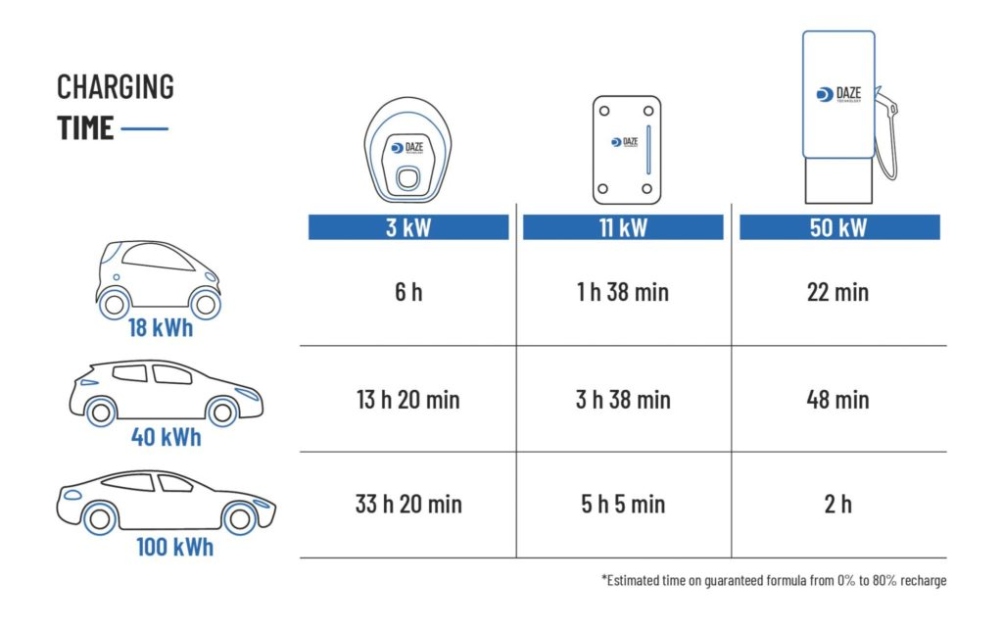Harnessing the Energy: Charging Your Electric Car
As we continue to move towards a more sustainable future, electric cars are becoming increasingly popular. With their environmentally friendly benefits and cost savings on fuel, it’s no wonder more and more people are making the switch to electric vehicles. But one common concern that many people have when it comes to electric cars is how to properly charge them and calculate the kilowatt hours needed to keep them running efficiently.

Image Source: daze.eu
Charging an electric car may seem like a daunting task at first, but with a little knowledge and preparation, it can be a simple and easy process. One of the first things you’ll need to consider when charging your electric car is the type of charger you have access to. There are three main types of chargers: Level 1, Level 2, and DC fast chargers. Level 1 chargers are the most basic and can be plugged into a standard household outlet. They are the slowest way to charge your electric car but can be a convenient option if you don’t have access to a more powerful charger.
Level 2 chargers are the most common type of charger and can be found at many public charging stations as well as installed in Homes. These chargers provide a faster charge than Level 1 chargers and are a good option for everyday charging needs. DC fast chargers are the quickest way to charge your electric car and are typically found at public charging stations. While they can be more expensive to use, they are ideal for when you need a quick charge on the go.
Once you’ve determined the type of charger you’ll be using, the next step is to calculate the kilowatt hours needed to charge your electric car. Kilowatt hours are a measure of energy consumption and are used to determine how much electricity is needed to charge your car. To calculate the kilowatt hours needed, you’ll first need to know the capacity of your car’s battery in kilowatt hours. This information can usually be found in your car’s owner’s manual or by contacting the manufacturer.
Next, you’ll need to determine the efficiency of your charger. Different chargers have different efficiencies, so it’s important to take this into account when calculating the kilowatt hours needed to charge your electric car. You can usually find the efficiency rating of your charger on the manufacturer’s website or by checking the charger itself.
Once you have the capacity of your car’s battery and the efficiency of your charger, you can use a simple formula to calculate the kilowatt hours needed to charge your electric car. Simply multiply the capacity of your car’s battery by the efficiency of your charger. For example, if your car’s battery has a capacity of 40 kilowatt hours and your charger has an efficiency of 90%, you would multiply 40 by 0.90 to get 36 kilowatt hours needed to charge your car.
By understanding how to properly charge your electric car and calculate the kilowatt hours needed, you can ensure that your car stays running efficiently and that you’re getting the most out of your electric vehicle. So next time you plug in your electric car to charge, remember that you’re not just powering up your vehicle – you’re harnessing the energy of the future.
Powering Up: Calculating Kilowatt Hours
When it comes to charging your electric Car, understanding how to calculate kilowatt hours is essential. Kilowatt hours are a measure of energy consumption, and knowing how many kilowatt hours your electric car needs can help you plan your charging schedule more effectively. In this article, we will delve into the world of kilowatt hours and explore how you can use this knowledge to power up your electric car efficiently.
To start with, let’s break down what kilowatt hours actually are. A kilowatt hour is a unit of energy equal to one kilowatt of power used for one hour. In the context of electric cars, kilowatt hours are used to measure how much energy is needed to charge the battery. The higher the kilowatt hour rating of your car’s battery, the more energy it can store and the longer it can drive on a single charge.
Calculating the kilowatt hours needed to charge your electric car is a straightforward process. The first step is to determine the capacity of your car’s battery in kilowatt hours. This information can usually be found in the car’s manual or on the manufacturer’s website. Once you have this number, you can then calculate how many kilowatt hours are needed to fully charge the battery.
For example, let’s say your electric car has a battery capacity of 60 kilowatt hours. If you are charging at a rate of 7 kilowatts per hour, it would take approximately 8.6 hours to fully charge the battery (60 kWh / 7 kW = 8.6 hours). By understanding this calculation, you can better plan your charging schedule to ensure your car is always ready to hit the road.
In addition to knowing how to calculate kilowatt hours, it’s also important to consider the cost of charging your electric car. Many charging stations charge by the kilowatt hour, so it’s helpful to know how much you are paying for each charge. By keeping track of your charging costs, you can budget more effectively and find ways to save money on charging.
One way to save on charging costs is to take advantage of off-peak charging rates. Many utility companies offer lower electricity rates during off-peak hours, making it more affordable to charge your electric car overnight. By timing your charges to coincide with these lower rates, you can reduce your overall charging expenses.
Another way to save on charging costs is to invest in a Home charging station. Home charging stations are more efficient and cost-effective than public charging stations, allowing you to charge your car for less money. By installing a home charging station, you can take control of your charging costs and enjoy the convenience of charging your car from the comfort of your own home.
In conclusion, calculating kilowatt hours is a key aspect of charging your electric car. By understanding how to calculate kilowatt hours and keeping track of your charging costs, you can power up your electric car more efficiently and affordably. So next time you plug in your electric car, remember the power of kilowatt hours and how they can help you drive into the future of clean, sustainable transportation.
Unveiling the Secrets: Electric Car Charging
As we move towards a more sustainable future, electric cars are becoming increasingly popular. With their eco-friendly benefits and cost savings on fuel, more and more people are making the switch to electric vehicles. But one question that often comes up is how to calculate the kilowatt hours needed to charge your electric car. In this article, we will unveil the secrets to electric car charging and help you understand the power behind it.
Charging an electric car may seem like a simple task, but there are a few factors to consider when calculating the kilowatt hours needed. The first thing to understand is the capacity of your car’s battery. This will determine how much energy it can store and how long it will take to charge. Most electric cars have a battery capacity measured in kilowatt hours (kWh), which is the amount of energy needed to power the car for a certain distance.
Another factor to consider is the charging station you will be using. There are different types of charging stations, each with varying charging speeds. Level 1 chargers, for example, are the slowest and typically use a standard 120-volt outlet. These chargers are convenient for overnight charging at Home but may not be practical for long trips or quick charges. Level 2 chargers, on the other hand, are faster and use a 240-volt outlet. These chargers are ideal for home charging or public charging stations.
For even faster charging, there are Level 3 chargers, also known as DC fast chargers. These chargers can charge an electric car to 80% in as little as 30 minutes, making them perfect for long road trips or quick charges on the go. However, not all electric cars are compatible with Level 3 chargers, so it’s important to check before you hit the road.
Once you have determined the battery capacity of your electric car and the type of charging station you will be using, you can calculate the kilowatt hours needed to charge your car. This can be done by multiplying the battery capacity in kWh by the charging efficiency, which is typically around 85-90%. For example, if your electric car has a battery capacity of 60 kWh and a charging efficiency of 85%, you would need 51 kWh to fully charge your car.
Understanding the kilowatt hours needed to charge your electric car is essential for planning your charging schedule and estimating the cost of charging. By knowing how much energy your car requires, you can avoid overcharging or undercharging your battery, which can affect its performance and lifespan. With the right knowledge and tools, you can confidently drive into the future with your electric car and enjoy the benefits of energy efficiency.
In conclusion, electric car charging doesn’t have to be a mystery. By unveiling the secrets behind calculating the kilowatt hours needed to charge your electric car, you can power up with confidence and efficiency. So next time you plug in your electric car, remember to consider the battery capacity, charging station type, and charging efficiency to ensure a smooth and sustainable driving experience. Drive on, eco-warriors, and embrace the power of electric cars!
Drive into the Future: Energy Efficiency Tips
As we continue to move towards a more sustainable future, electric Cars have become increasingly popular. With their environmentally friendly nature and cost-effective benefits, more and more people are making the switch from traditional gas-powered vehicles. However, one common concern that many new electric car owners have is how to ensure that their vehicle is being charged in the most energy-efficient way possible.
In this article, we will explore some energy efficiency tips that will help you get the most out of your electric car while minimizing your impact on the environment. By following these tips, you can ensure that your electric car is being charged in the most efficient way possible, saving you both time and money in the long run.
One of the first things to consider when it comes to energy efficiency with your electric car is the type of charger that you are using. Level 1 chargers, which are typically the standard chargers that come with most electric cars, are the slowest option for charging your vehicle. While these chargers are convenient for overnight charging at Home, they are not the most efficient option for quick charging on the go.
For faster charging times, it is recommended to invest in a Level 2 charger for your home or workplace. These chargers can provide a full charge in just a few hours, making them a more efficient option for those who are constantly on the go. Additionally, many Level 2 chargers are equipped with smart features that allow you to schedule charging times during off-peak hours, further maximizing energy efficiency.
Another important factor to consider when it comes to energy efficiency with your electric car is the time of day that you are charging your vehicle. Electricity rates can vary throughout the day, with peak hours typically being more expensive than off-peak hours. By charging your electric car during off-peak hours, you can take advantage of lower electricity rates, saving you money in the long run.
Additionally, some utility companies offer special programs and incentives for electric car owners who charge during off-peak hours. By participating in these programs, you can further maximize your energy efficiency and potentially save even more money on your electricity bill.
In addition to choosing the right charger and charging during off-peak hours, there are several other energy efficiency tips that can help you get the most out of your electric car. One tip is to avoid letting your battery drain completely before recharging it. Lithium-ion batteries, which are commonly used in electric cars, perform best when they are kept at a consistent charge level. By recharging your battery before it reaches a low level, you can prolong its lifespan and ensure that your electric car is operating at peak efficiency.
Another energy efficiency tip is to avoid rapid charging whenever possible. While rapid chargers are convenient for quickly topping up your battery, they can also put additional strain on the battery and decrease its overall lifespan. Whenever possible, opt for slower charging options that are gentler on the battery and more energy-efficient in the long run.
By following these energy efficiency tips, you can ensure that your electric car is being charged in the most efficient way possible. Not only will this help you save money on your electricity bill, but it will also reduce your carbon footprint and help contribute to a more sustainable future. So, whether you are a seasoned electric car owner or just starting out on your electric vehicle journey, keep these energy efficiency tips in mind to get the most out of your electric car and drive into the future with confidence.
how many kilowatt hours to charge an electric car





